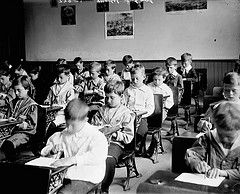Motivation
This Is How You Should Learn
Think it's beginner's luck? Think again. There's a science to becoming skilled.
Posted April 28, 2015

Over the last year, I've signed up for multiple online courses in graphic design, screenwriting, web design, computer programming - you name it - only to quit a few video lessons in. I've bought books on these subjects too, only to feel overwhelmed and lost before the end of the first chapter.
An avid learner in my earlier life, I don't know if this education rut is explained by laziness or lack of available storage space in my brain.
As much as I'd like to blame the latter, it's more likely the former.
Why I'm lazy is that I lack real motivation. And my lack of motivation stems from being unable to connect with the learning material. Learning web design from a book is akin to learning how to swim by watching a youtube video. The knowledge source, while providing instruction, isn't the most effective.
According to research from the National Academy of Sciences, the most effective (and exemplary) teaching methods are those that truly engage its students.
In one study, researchers found that outstanding history teachers:
"Rather than simply introduce students to sets of facts to be learned, these teachers help people to understand the problematic nature of historical interpretation and analysis and to appreciate the relevance of history for their everyday lives."
For example, Bob Bain, a public school history teacher, starts the school year by asking his ninth graders to write down what they believe are to be the most important artifacts of the past.
By doing this, "the students explicitly articulate their underlying assumptions of what constitutes historical significance."
Bain writes all the responses on a poster that he hangs on the wall, and together with the class, determines "rules for determining historical significance" -- or the explanations to why and how they chose those particular artifacts. These rules then act as a "lightning rod for class discussions throughout the year, undergoing revisions and elaborations as students become better able to articulate their ideas."
Though initially students are sticklers to these rules, eventually, they begin to see how historians have adopted varying viewpoints and become less adherent. Through this process, they understand (and learn!) the interpretative nature of history.

By building upon the students' existing foundation of knowledge, the teaching becomes less about facts and dates and more about engagement and discussion. In other words -- the best learning shouldn't really feel like learning at all.
Albert Einstein -- one of the greatest learners in history -- agrees. Upon learning how much his son enjoyed playing the piano, Einstein wrote a letter to him, which included the following sage advice:
"That is the way to learn the most, that when you are doing something with such enjoyment that you don't notice that the time passes. I am sometimes so wrapped up in my work that I forget about the noon meal..."
Einstein's theory of general relativity (which he had completed just before writing this letter) was probably a lot of fun for him to learn.
But is fun enough?

Simply enjoying something is a great way to keep motivated, but to make sure that it stays in your brain for an extended period of time requires something else entirely. I know you know what it is.
Practice.
Research in Psychological Science in the Public Interest indicates the best ways to learn are:
- Practice tests
Taking practice tests, while awful and no fun at all, really does improve your memory. Also good to know: the more a test strays from typical multiple choice questions and delves into detailed response territory, the more effective. Moreover, "practice testing is effective when you create the questions yourself."
Big Think suggest two simple ways to apply this research in real life: creating flash cards or using the Cornell note-taking system.
- Distributed practice
Studies suggest that you should be practicing 10-20 percent of the length of time that you want to remember something. For example, if you want to retain information for one year, you should be studying every month. And if you want to remember something for 10 years, you should be setting aside some time to practice every one to two years.
Distributed practice is also pretty much the opposite of cramming the night before a test, which is considered one of the worst ways to study. Does anyone ever remember anything they've crammed in the night before?
Techniques that don't really work include: highlighting, making summaries, keyword mnemonics, rereading -- basically, all the things I used to do in school.
How do you learn best? Share tips and advice on what works for you in the comments below.
Follow me on Twitter at @thisjenkim
Want to get an update when I write a new post? Sign up here.




